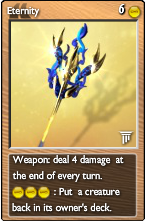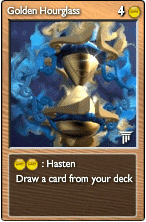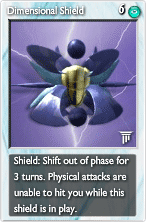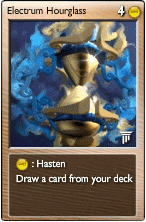Golden Hourglass
|
|
Contents
Overview
As one of the most symbolic permanents in game, the Golden Hourglass is often considered to be a very vital permanent in any Time deck, due to its simple ability. Hasten allows the player to draw an additional card when activated, thus increasing a player’s draw rate per turn. While many decks generally end up with a total around 30 cards, the Hourglass allows any player (with ![]() quanta) the ability to draw more cards out of their deck, thus ‘shortening’ a bigger deck in the long run.
quanta) the ability to draw more cards out of their deck, thus ‘shortening’ a bigger deck in the long run.
General Use
Quick Facts:
- Hourglasses require a 1-turn wait before being able to be used, and can only draw up to 1 additional card per turn.
- High-leveled AI (especially False Gods) will generally try to remove your Hourglasses before all other permanents.
- Clicking on the Hourglass while you have zero cards left will result in an automatic loss (deck-out).
The Golden (or Electrum) Hourglass has an activated ability that can be used each turn (excluding rare weapons). Although many decks revolve around having around 30 cards to increase the chances of finding what they need, Hourglasses extend that number to higher quantities, thus giving you more draws to play more creatures, spells, or other permanents to control the battlefield. Because it has an activated ability, playing the Hourglass places a 1-turn ‘wait’ for you to use its ability (similar to creatures with activated abilities). However, once that turn passes by, you’ll be able to use Hasten on each subsequent turn (once per turn) to draw needed cards to help you win.
Because of the massive gain of drawn cards per turn, having multiple Hourglasses on the field will allow the player to draw multiple cards from the deck to either play or save them for special combos; of course, if you are unable to play these cards based on your quanta pool, you may risk placing yourself in a position where you may have to discard a card (overdrawing).
Unlike Sundials, Hourglasses are a mono-type card and do not require ![]() quanta in order to gain use of the Hasten ability. Unfortunately, they are somewhat expensive. For an initial four
quanta in order to gain use of the Hasten ability. Unfortunately, they are somewhat expensive. For an initial four ![]() quanta, a player may potentially increase their draw rate for the entire course of the battle. Unupgraded, the Hasten ability costs 2
quanta, a player may potentially increase their draw rate for the entire course of the battle. Unupgraded, the Hasten ability costs 2 ![]() quanta to use, making it an even more expensive card when used constantly; if you upgrade it however, Hasten is reduced to only 1
quanta to use, making it an even more expensive card when used constantly; if you upgrade it however, Hasten is reduced to only 1 ![]() quanta, making it easy to fuel for any deck with a Time Mark.
quanta, making it easy to fuel for any deck with a Time Mark.
There are of course other weaknesses with Hourglass. Aside from overdrawing, the Hourglass is one of the most well-known (and potentially threatening) permanents in any game, especially against the A.I. (specifically False Gods). Player and computer opponents alike may tend to use permanent control to either take or destroy an Hourglass away from the player, thus denying them the ability to speed up their deck as a whole. False Gods specifically aim for your Hourglasses before everything else (including shields, pillars, and some weapons). The reason is simple: if you can increase your draw rate to their amount (two cards per turn) or more, then your deck can be potentially just as dangerous as theirs. Because of this, it’s important to either take counters to permanent control, or simply be cautious of the quanta they have from each element to determine if your Hourglass will be rendered useless.
Synergies
 A major concern is the possibility of decking yourself out; if you draw too many cards with your Hourglasses too quickly, you may find yourself with fewer cards than the opponent, which may end in your loss against a stalling deck ? in other words, you’ll lose by not having any cards left to draw. In addition, using Hasten while having zero cards left will result in an automatic loss (deck out), which can occur if you're not careful where you're clicking. Eternity | Eternity (or the spell Rewind) helps prevent this issue by rewinding your creatures back into the deck to avoid deck-out.
A major concern is the possibility of decking yourself out; if you draw too many cards with your Hourglasses too quickly, you may find yourself with fewer cards than the opponent, which may end in your loss against a stalling deck ? in other words, you’ll lose by not having any cards left to draw. In addition, using Hasten while having zero cards left will result in an automatic loss (deck out), which can occur if you're not careful where you're clicking. Eternity | Eternity (or the spell Rewind) helps prevent this issue by rewinding your creatures back into the deck to avoid deck-out.
 Despite the above issues, Hourglasses are often used in various decks that have 40-60 cards in them to avoid the issues of not having the cards you need in hand to play. In fact, because of its very nature, Hourglasses are generally good in stalling decks where you use defenses or other cards to delay your opponent from killing you outright ? Sundial | Sundial is an exceptional card to use in combination with Hourglasses, as the temporary halt of creature attacks can give some breathing room for you to draw support or control cards.
Despite the above issues, Hourglasses are often used in various decks that have 40-60 cards in them to avoid the issues of not having the cards you need in hand to play. In fact, because of its very nature, Hourglasses are generally good in stalling decks where you use defenses or other cards to delay your opponent from killing you outright ? Sundial | Sundial is an exceptional card to use in combination with Hourglasses, as the temporary halt of creature attacks can give some breathing room for you to draw support or control cards.
 Dimensional Shield | Phase Shield is another great card to use with the Hourglass, for two special reasons; first off, Dimensional Shield has a lower priority against enemy A.I. PC usage; should you face a tough opponent with generous permanent control, playing an Hourglass to bait those spells may allow you to safely play other more vital permanents (Dimensional Shield) without them being at risk for destruction. Secondly, because of the shield's duration and longevity, players can choose to use Hourglasses to help draw another shield to continue providing the damage immunity (a technique called chain-shielding).
Dimensional Shield | Phase Shield is another great card to use with the Hourglass, for two special reasons; first off, Dimensional Shield has a lower priority against enemy A.I. PC usage; should you face a tough opponent with generous permanent control, playing an Hourglass to bait those spells may allow you to safely play other more vital permanents (Dimensional Shield) without them being at risk for destruction. Secondly, because of the shield's duration and longevity, players can choose to use Hourglasses to help draw another shield to continue providing the damage immunity (a technique called chain-shielding).
Other Cards With Synergy
Cards such as Protect Artifact and Cloak can help protect your Golden Hourglasses from being touched by the opponent, as they either negate the PC or force the opponent to waste permanent control on other permanents instead. Mindgate can also serve as an alternative way for one to gain additional cards from the opponent to use (given that you can use their cards with the right quanta), and that it is less likely to be targeted by PC if an Hourglass on the field. Precognition can also serve as a burst form of drawing in case your Hourglasses are destroyed, while also providing additional intel on the opponent's hand.
Conclusion
From these facts alone, the Hourglass is a figurative ‘heart’ of various larger rainbow decks that require multiple cards from different elements, pumping in cards to maintain a steady flow of quanta generation (drawing pillars and towers) and quanta usage (control/support/damage cards). If you find yourself fighting an opponent with multiple Hourglasses in a large deck, one should find their true use, as the Hourglasses may be either bait (permanent control) or the figurative key for that deck to function.
Popular Deck

6rn 6rn 6rn 6rn 6rn 7n2 7n2 7q0 7q0 7q0 7q0 7q0 7q0 7q0 7q0 7q0 7q0 7q0 7q0 7q0 7q5 7q5 7q5 7q5 7q5 7q5 7q8 7q8 7q8 7q8 7qe 7ri 7ri 7ri 7ri 7ri 7ri 7ri 7ri 7ri 80b 80d 80d 80d 80d 80d 80d 80h 80h 80i 8pu

